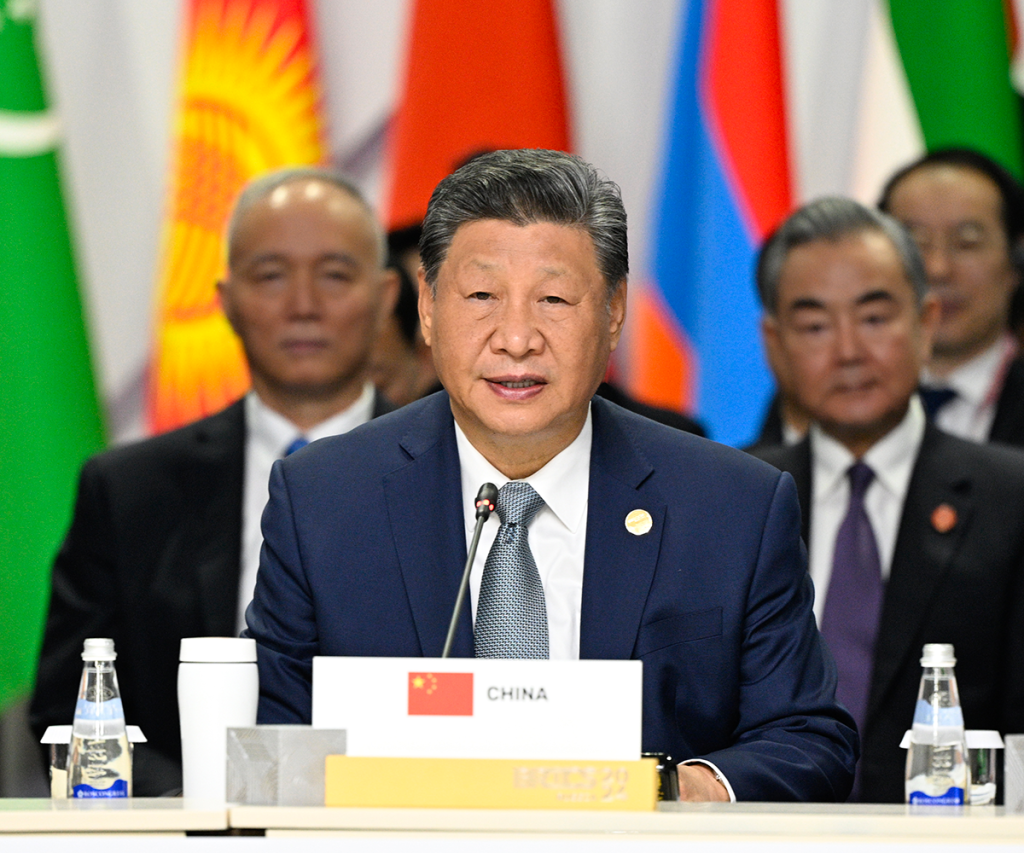Xi urges 'BRICS Plus' to pursue common security, development, harmony

Chinese President Xi Jinping on Thursday called on "BRICS Plus" countries to strive for common security, common development and harmony among civilizations.
Xi made the remarks while addressing the "BRICS Plus" leaders' dialogue.
Noting that the collective rise of the Global South is a distinctive feature of the great transformation across the world, Xi said that Global South countries marching together toward modernization is monumental in world history and unprecedented in human civilization.
Meanwhile, peace and development still faces severe challenges and the road to prosperity for the Global South will not be straight, he pointed out, urging "BRICS Plus" countries to use collective wisdom and strength and stand up to their responsibility for building a community with a shared future for mankind.
Xi said that "BRICS Plus" countries should uphold peace and strive for common security, come forward together to form a stabilizing force for peace, strengthen global security governance, and explore solutions to address both symptoms and roots of hotspot issues.
"BRICS Plus" cooperation has accelerated the transformation and improvement of the existing world order by providing multiple alternatives. The expansion of BRICS will, in fact, contribute to the cohesion of consensus among the Global South amid a complicated international background, said Chinese experts.
President Xi has chaired or attended the BRICS summits for 12 years running, promoted the establishment of the New Development Bank, and put forward the "BRICS Plus" cooperation format and a good number of important proposals and initiatives, giving a strong boost to BRICS cooperation, Foreign Ministry spokesperson Lin Jian said on Thursday.
Through this summit, China stands ready to work with other BRICS countries to open a new horizon in the high-quality development of greater BRICS cooperation, and make BRICS' contributions to building a community with a shared future for mankind, Lin said.
BRICS leaders issued a joint declaration covering a wide range of issues from the reform of the United Nations (UN) to ongoing global conflicts, following the association's summit that took place on Wednesday in Kazan.
New centers of power, policy decision-making and economic growth are emerging in the world, BRICS countries said Wednesday in the Kazan Declaration.
The BRICS countries also called for the reform of the Bretton Woods system to enhance the representation of emerging markets and developing countries in the Kazan Declaration, according to Xinhua.
In the process of the collective rise of the Global South, the BRICS Plus countries have played a role in introducing alternatives to the tools that maintain the West-dominated international order, Cui Heng, a scholar from the Shanghai-based China National Institute for SCO International Exchange and Judicial Cooperation, told the Global Times on Thursday.
Many developing countries are worried about what is happening around the world, be the economic or security problems, that's why they came here to Kazan for the summit, that's why Global South countries want to follow BRICS, Lidia Zhelamkova, a Russian journalist, told the Global Times.
BRICS Plus has played a very important role in promoting consensus among the Global South and has positively contributed to its economic development, Song Wei, a professor from the School of International Relations and Diplomacy at Beijing Foreign Studies University, told the Global Times.
Reaching consensus
In recent years, there have also been doubts as to whether further BRICS expansion would affect the organization's unity and the process of reaching a consensus. Al Jazeera published an opinion piece last year saying that taking in more members too quickly could leave BRICS incoherent, weakening rather than strengthening the bloc.
Shadrack Andile, a reporter from BRICS Africa Channel, said that the essence of pushing forward cooperation between BRICS and Global South countries is for countries to reach consensus, and that the new members will not dilute its unity. "Bringing more countries into BRICS means leaving no one behind. It's not about competing; it's about collaborating for a better world."
BRICS has sent a clear message that the status quo in global governance is no longer acceptable to the majority of the world's population. The persistent economic and political disparities will become increasingly untenable, driving more countries to seek alternative alliances. The success of BRICS initiatives, such as the New Development Bank, is solidifying the appeal of the BRICS model, Ahmed Moustafa, director of the Asia Center for Studies and Translation in Egypt, told the Global Times.
In the foreseeable future, the BRICS mechanism will evolve into a formidable force, influencing the decisions of established global institutions. The growing membership and influence of BRICS will send a powerful message that the future of global governance lies in collaborative, inclusive and equitable models, said Moustafa.